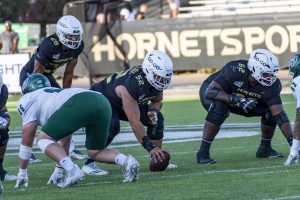Code of conduct revisions hit students’ cyber world
January 6, 2007
Sacramento State unveiled the recently revised California State University Student Conduct Code, also known as Title V, on Jan. 30. It was updated in November 2005 to promote quality student conduct in the 21st century, with special modifications for modern technology and open concern regarding hazing.
Another change to the code is regarding students’ behavior off campus, specifically cyberspace behavior.
According to the code, which is available on the Sac State Web site, if students post obscene content on a Web site and an outside source reports it the student that published the Web page, as well as any other students involved, could be disciplined by the university.
Jessica Heskin, educator of Violence and Sexual Assault Support Services, said code violations include students posting obscene content on Web sites.
Heather Dunn-Carlton, special program coordinator with Student Affairs, said, “We have to connect (obscene behavior) back to campus in order to take action through the code.”
According to the code, students should be good citizens, so their behavior will reflect positively on the university. Also, any menacing behavior towards another student, staff or faculty member of the university community is prohibited.
“Students have rights and responsibilities,” said Leonard Valdez, campus judicial officer with Student Affairs.
Valdez also stated that MySpace comments “are fine as long as it’s not insulting or going beyond the norm.” Valdez said he has “never been on MySpace” and he does not browse the site for possible offenders.
Dunn-Carlton said Student Affairs does not spy on every student that has a MySpace Web page. However, if a case has been filed, then Student Affairs would follow up on the students involved.Web sites, such as MySpace, Friendster, Yahoo! 360 and Facebook, regulate what users post on their personal pages. For example, Yahoo’s guidelines warn users from posting any harassing, threatening or objectionable content.
Ranjit Bains, a senior economics major, said, “If students want to represent themselves in that way (as obscene), then they should be disciplined.”
On the Sac State server Web site for students, faculty and staff, the policy states that no viruses, “obscene, pornographic or excessively violent materials” will be allowed for submission to create personal Web pages.
Dunn-Carlton said students are also prohibited from downloading music via the university server. Downloading music would create such a wide broadband that other students on the server could not use the system properly.
Dunn-Carlton said there are three possible options once a case is taken by Student Affairs ?” cases can either be dismissed, a resolution can be accepted, and in some cases a resolution cannot be reached, so a formal hearing is made. Then a hearing officer reviews the case and submits a sanction.
Valdez said a verbal warning could be issued if students are not sure of the student conduct policy. Ann Brick, a staff attorney with the American Civil Liberties Union of Northern California, said that any university in the CSU system must “pass a high barrier of protected free speech” to legally discipline students for writing lewd and obscene comments online.
Brick said students could only be disciplined if university computers or wireless Internet are used to post or download lewd content. However, the university could not go after students if they were to download or upload indecent matter using their personal computers off-campus with personal Internet access.
Henry Cheung, a senior computer science major, agreed that students should be disciplined for downloading improper material.
“The school provides the Internet access and (some) students download lots of music or look at pornography,” Cheung said. “Our school should prevent these things from happening.”
Jared Mathews, a junior international business major, said, “If (students downloading or uploading questionable material onto the Internet) are breaking the conduct code, then Student Affairs should discipline them.”
Two San Francisco City College professors attempted to sue a student in 2000 for creating a teacher-critique Web site, similar to SacRate.com. The two professors eventually dropped the lawsuit against the student.
Bernard Burk, the attorney who represented the student, said in a press release, “It fulfills the promise Congress made – enacting the Communications Decency Act, and the promise the Founders made to everyone in adopting the First Amendment.”
Jamie Gonzales can be reached at [email protected]
























































































































